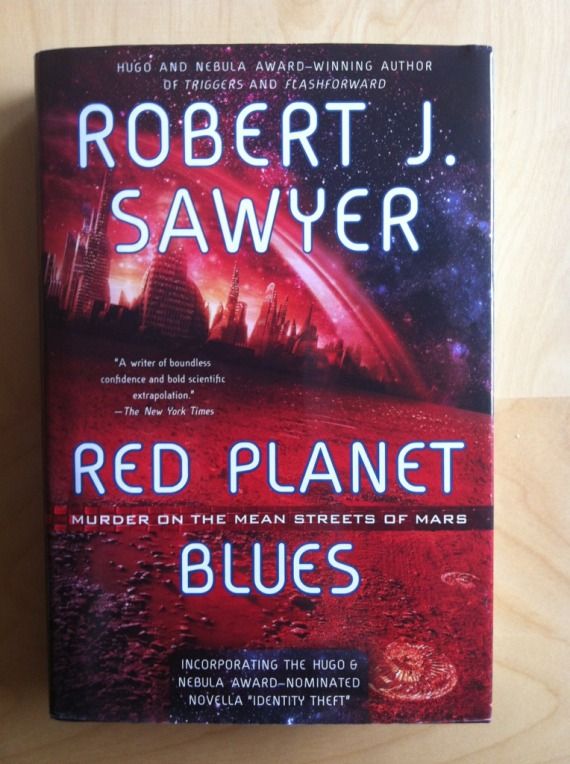Or why you should read Red Planet Blues by Robert J Sawyer
There's Martian fossils in the red hills of Mars beyond the frontier town of New Klondike. Fossils and the promise of fortune for any enterprising human or uploaded-human-android Transfer lucky enough to find the perfect specimen. Or better yet, there is the possibility of finding the long lost Alpha Deposit, the mother lode of exquisite, priceless Martian fossils, and becoming rich beyond anyone's wildest dreams. And so New Klondike is a town of hopeful prospectors, dejected failures, and the seedy economy of a hard-on-its-luck frontier town built in a dome on Mars. New Klondike is also a company town where the law is less interested in Justice than keeping the piece and protecting the owners assets. And so Alex Lomax, the only Private Eye on Mars, is on the case. These are his Red Planet Blues.
Red Planet Blues is a tale of frontier life, of gold rushes and arctic explorers and greed; extrapolated into a Science Fiction story exploring the concepts of Martian colonies, alien palaeontology, and humans uploading their minds into robots; presented with the style and panache of a pulp Dectective serial. To a certain extent Red Planet Blues, as is perhaps appropriate for a novel set on a planet with a fraction of Terrestrial gravity, is a bouncy read. In being such a loving pastiche of pulp storytelling the novel provides a lot of swashbuckling adventure but also, in its dangerous dames and sassy puns, an inherent eyebrow-shrugging-goofiness. The result is a fairly light and infectiously fun novel that clearly reads like it was a ton of fun to write.
But that isn't to say that Red Planet Blues isn't also a smart piece of Science Fiction. While the action as fast and lose with the rules as the protagonist, the high concept Science Fiction is grounded and thoughtful. The tribulations of living on Mars and the treatment of the Martian Fossils carries the authoritative weight all of Sawyer's work seems to. Moreover, the concept of having Transfers, androids run by the minds of uploaded humans, as robots exploring Mars for signs of life is just such a brilliantly clever and timely decision. At once gobsmackingly obvious and deviously subversive. (It also, I think, makes Red Planet Blues a semi-sequel to Mindscan, another great Sawyer novel.) My point here is that under the hood of the adventuring detective story is an elaborate engine of Sci-fi that gives the novel some literary depth.
My only real criticism of the novel is that some of the earlier who-dunnits of Red Planet Blues were kind of obvious to me. Now, it might be that I've read a few novels lately that play with the idea of human minds as software (Accelerando and Glasshouse, The Accord) or it could be that my significant other and I have watched too much mid-nineties Law and Order, but some of the cases just immediately suggested their solutions. To be fair though, as the novel progresses the capers become more convoluted and complicated, leading to some satisfying and unexpected twists in later parts. Which, if you think about it, is probably the right direction for increasing complexity.
At the end of the day I'd recommend this book to fans of genre fiction, be they Sci-fi, detective, or adventure aficionados. Red Planet Blues is, after all, a stupendous combination of these genres. I also can't help but think this is a novel that could be foisted well onto youth readers: it's fun, informative, and exciting enough to keep pages turning. Just be aware that it's genre-appropriately violent and acknowledges the existence of sex in a way that is somewhat discrete but still honest about how things work. Depending on your parenting style, it might get a bit racey. But yeah, I whole-heartedly recommend this book.

No comments:
Post a Comment